
Oct 28, 2024
More than 200 International Lawyers Assisting Workers Network (ILAW) members gathered in Casablanca, Morocco, October 9 to 11 at their 2024 Global Conference to share ideas and to collaborate on legal strategies to promote and defend worker rights.
The Solidarity Center established the ILAW Network in 2018 as a way for pro-labor lawyers worldwide to bring together legal practitioners and scholars in an exchange of ideas and information in order to best represent the rights and interests of workers and their organizations wherever they may be.
ILAW lawyers working together have taken legal strategies that are successful in one country and deploy them elsewhere. In doing so, they have set new legal precedents that build a stronger foundation for the expansion of worker rights around the globe.
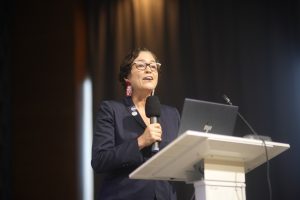
Credit: Mosa’ab Elshamy
Solidarity Center Executive Director Shawna Bader-Blau welcomed attendees, describing the network of over 1,300 members in more than 90 countries as “uniquely situated to take on global corporations suppressing worker rights.”
She cited the successful advocacy of women labor lawyers for new International Labor Organization (ILO) treaties, like Convention 189 on domestic workers and Convention 190 on violence and harassment.
Solidarity Center Rule of Law Director and ILAW Network Chair Jeffrey Vogt laid out the conference’s purpose. “Around the world, the rights of workers and unions are under attack. Employers are well-resourced and coordinated in their efforts to shape law and policy. It is essential that workers and unions do the same. Through ILAW, we can learn from each other, build from successes and failures, and strengthen our impact through legal solidarity.”
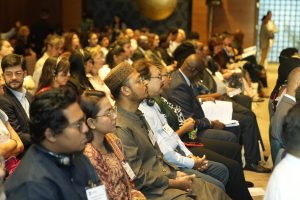
Credit: Mosa’ab Elshamy
The importance of interconnectedness was woven throughout many plenary sessions and discussions. Networking, learning from and collaborating across countries and regions was a key part of the conference, as attendees talked about the commonalities of their work.
The opening plenary, moderated by Solidarity Center’s Rule of Law Deputy Director Monika Mehta, focused on the impact of technology in the world of work, including but not only digital platform workers, from Amazon warehouses workers to content moderators for major social media firms.
Panelist Liz Lenjo described the content moderators in Kenya who filed a lawsuit against Meta (the parent company of Facebook, Instagram and Threads) and Sama, the local contractor, citing poor working conditions, union busting and inadequate mental health support.
These workers were hired to screen posts, videos and messages for Facebook and remove harmful or offensive content. Workers spent hours viewing violent and disturbing images and videos. They were left on their own to deal with the psychological trauma. In a landmark ruling, the Kenyan court determined it had jurisdiction over Meta.
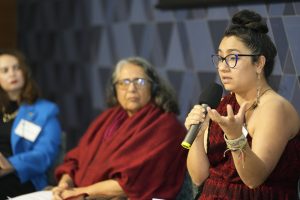
Credit: Mosa’ab Elshamy
Sandra Muñoz discussed how women in Colombia’s parliament recently passed legislation to harassment in the workplace and linked the fight for equality to equality for all. “Unless we can overcome inequality,” Muñoz said, “we can’t overcome inequality as a whole.”
Kayan Leung also described successful litigation she undertook in South Africa to establish parity in paid parental leave in order that the responsibility of care does not default to women. The ILAW Network filed an amicus brief in that case.
During the panel on Just Transition, Angelica Maria Palacios Martinez spoke about the efforts to get Colombia’s government to recognize trade unions’ essential role in Just Transition and protecting the whole population. “From the trade union world, we have called out the government to recognize us as a key player, she said, “so that these public policies are focused on protecting the entire population, and in particular, protecting the workers.”
Abdullah Nahid of the Maldives, one of the countries most affected by climate change, described union efforts to support workers in the tourism and fisheries sector.
On the panel on the informal economy, Madhulika Tatigotla discussed the growth of the informal economy in India. India’s informal economy continues to grow, as the formal sector continues to informalize as, for example, 40 percent of factory workers are now on temporary contracts. Recently, workers and their legal advocates developed a comprehensive draft law for workers in the informal economy to extend labor rights and benefits.
In the final right to strike plenary, Paapa Danquah noted the increasing international threats to the right to strike, linking it to civil liberties. “The attack on the right to strike on the international level is the first step to taking away the right to strike everywhere,” Danquah said. “Whenever you see attacks on the right to strike, there are also attacks on collective bargaining and civil liberty.” He described how the ITUC was involved in litigation before the International Court of Justice to protect the right to strike as a principle of international law.
As the conference ended, attendees discussed priorities for the coming year, from more collaboration between all members to deepening national and regional labor law networks, cross-pollination between ILAW regions, increasing engagement with social movements and Indigenous communities in order to support union growth. Attendees left the conference energized and committed to forging a robust labor law network for a stronger global labor movement.
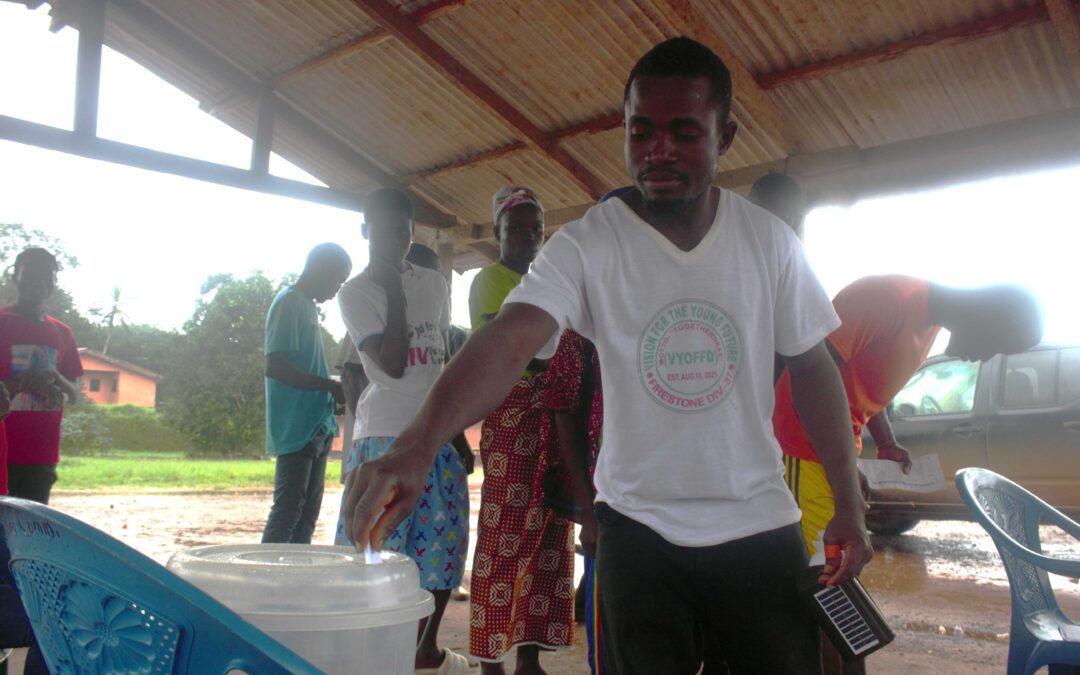
Sep 4, 2024
In a significant win for equity on Firestone Liberia’s rubber plantation in Harbel, more than 90 percent of contract workers voted Saturday to join the Firestone Agricultural Workers’ Union of Liberia (FAWUL). With 1,660 votes for FAWUL representation, contract workers won the right to negotiate collectively with the employer for, they hope, the same wages and benefits currently enjoyed by directly employed workers who are already represented by FAWUL.
“We owe it to generation after generation of workers who have suffered to secure good jobs and dignity for ALL,” says FAWUL Chairperson Rodennick Bongorlee.
FAWUL’s organizing success is the result of the union’s long-term campaign for equity for Firestone’s contracted workers, whose precarious jobs and low wages, often for the same work as permanent employees, are in stark contrast to hard-won worker rights on the rubber plantation.
A 2008 collective bargaining agreement (CBA) and subsequent agreements were key for workers and labor rights in Liberia, where Firestone is the country’s largest employer. Previous to these agreements, plantation workers had endured working conditions that a 2005 human rights lawsuit against the company described as,”forced labor, the modern equivalent of slavery,” where exploitative quotas resulted in excessive hard labor and children working alongside their parents in lieu of attending school. However, through a series of agreements with the company since 2008, FAWUL won for directly employed workers improved conditions that include reduced quotas, better working conditions and compensation, on-site free schooling for workers’ children, a free onsite health clinic and somewhat improved housing.
But, after 15 years of partnership with agricultural workers on the plantation, the company is increasingly backtracking. By FAWUL’s calculations, since 2019, some 3,500 full-time jobs have been lost to Firestone-imposed transfers to contract positions, lay-offs and forced retirements. In 2019, Firestone fired up to 2,000 employees and required them to sign contracts with “labor contractors,” who in turn hired the former employees to perform the same work under Firestone Liberia’s supervision, but at significantly lower rates of pay, with no benefits and without the protections provided by FAWUL’s CBA.
Without collective voice and effective representation through a union, contract workers have been subject to safety risks and exploitation. Although all plantation workers face grave dangers to their health and safety, low-wage contract workers cannot afford personal protective equipment such as boots, gloves and glasses and are at increased risk related to acid use and snake bite exposure. And inadequate company housing for contract workers—usually a small, two-room brick apartment that houses 15–20 people from two extended families—is exposing contract workers and their families to unsafe crowding and, some workers report, rat infestation.
And, without CBA protection, contracted workers complain of economic exploitation. Contract tappers last month were describing Firestone Liberia’s measurement process for reimbursing latex extraction as “cheating,” and said they are being forced to work excessive overtime regularly without commensurate pay or, sometimes, any pay at all. Contract cup washers, most of whom are women who walk more than an hour to work, say they too are forced to work excessive hours without fair or, sometimes, any compensation. Excessive hours are enforced by threat of discipline or dismissal contract workers told the Solidarity Center—a very serious threat for those trapped in debt bondage to the company.
“We applaud the courage and spirit of the Firestone plantation workers who have steadfastly fought for a union to improve their lives and working conditions,” says Solidarity Center Executive Director Shawna Bader-Blau.
FAWUL in 2007 was awarded the AFL-CIO’s annual George Meany-Lane Kirkland Human Rights Award in recognition of the union’s “extraordinary courage” in successfully organizing more than 4,000 Firestone Liberia workers for the first time in the company’s 82-year existence in the country. An indirect subsidiary of Bridgestone Americas Inc., Firestone Liberia is the largest contiguous natural-rubber producing operation in the world. The company supplies Bridgestone with raw and block latex with which to manufacture tires in the United States. Approximately 25,000 people reside on the Firestone-Liberia plantation, including roughly 8,500 workers with their families. Because Firestone Liberia is an employment-standards trendsetter, plantation wages and working conditions have a direct impact on the livelihoods, rights and dignity of all workers in Liberia.
The Solidarity Center, in partnership with the United Steelworkers (USW), works with Liberian unions in key extractive industries such as mining, timber and rubber, as well as with domestic workers, to support them as they better serve their members and assist workers in forming unions.

Jul 26, 2024
More than 500 Philippine workers and trade unionists joined a march on July 22nd in Quezon City, demanding that President Ferdinand R. Marcos, Jr. declare support in his State of the Nation Address (SONA) for legislation that would further raise the minimum wage.
The Regional Tripartite Wages and Productivity Board approved a 35 PHP (approximately 0.60 US dollar) daily minimum wage hike for workers in the capital region earlier this month. This falls far short of the 150 PHP (about 3 US dollars) wage hike the National Wage Coalition has persistently called for to support workers’ economic recovery amid high inflation, poor job quality and a lack of new and decent jobs.
The Coalition, representing local workers across various industries and sectors, has remained steadfast in demanding livable wages and are advocating for multiple bills that have been introduced but still await action from the government.
The president has yet to engage in dialogue with Philippine Labor representatives and did not mention wages in his SONA.
Coalition member, Center of United and Progressive Workers (SENTRO), noted in an online statement, “[t]he [national government’s] absence of genuine effort to attain long-term solutions against rising costs and the provision of measly increases that leave workers running in place against inflation…” SENTRO added, “We deserve higher wages not simply because of our labor, but because we are human beings who have every right to live peacefully and decently.”
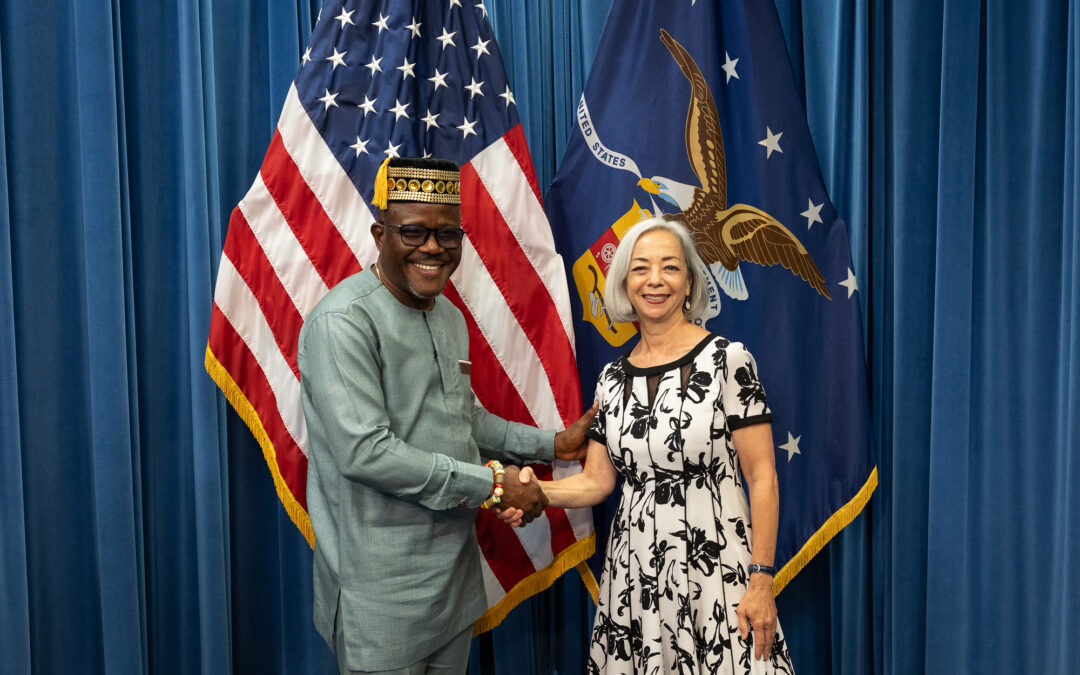
Jul 22, 2024
General Agricultural Workers’ Union of Ghana (GAWU) Deputy General Secretary Andrews Addoquaye Tagoe was recognized last month by the U.S. Department of Labor (USDOL) for his role in advancing child and worker rights and for reducing child labor in Ghana’s agricultural industry.
“Where the union is present, child labor is absent,” Tagoe said about GAWU’s campaign to end child labor on Ghana’s cocoa farms.
Alarmed by increasing child labor in Ghana and Ivory Coast cocoa production, GAWU is addressing child labor in cocoa farming communities by applying a child-labor-reduction model honed in fishing communities on Lake Volta. The program raises awareness and incomes of parents so that kids can stay in school.
Although the cocoa industry’s biggest companies pledged to eradicate the “worst forms” of child labor in their supply chains nearly 20 years ago, up to 2 million children are estimated to be engaged in cocoa production in West Africa—primarily in Ghana and Ivory Coast. The two countries together supply roughly 60 percent of the world’s cocoa beans. As cocoa production in both countries has increased, so has child labor.
The profitable global chocolate market last year was worth $132.65 billion, with three major global chocolate brands together earning almost $4 billion in profits from chocolate sales while a fourth global brand’s confectionery profits totaled $2 billion. The four corporations on average paid out 97 percent of their total net profits to shareholders in 2023, reports Oxfam. Meanwhile, up to 58 percent of cocoa farmers in Côte d’Ivoire and Ghana were living below the World Bank extreme poverty line in 2021 and up to 90 percent did not earn a living income. According to the Child Labor Coalition, of which the Solidarity Center is a member, the cocoa industry must pay a living income while scaling up programs that identify child laborers and ensure that children can go to school.
”Building worker voice at local and national levels for farmers to benefit from higher cocoa prices and the profitable global chocolate industry will help end child labor, says GAWU.
Children in Ghana are subjected to the worst forms of child labor, including in fishing and cocoa production, reported USDOL in 2022. More than half of children living in agricultural households in Ghana are reportedly engaged in child labor, most in at least one form of hazardous child labor.
By organizing and formalizing the agricultural economy in rural areas and working with communities to eliminate child labor, Tagoe has developed and implemented child labor free zones resulting in ‘withdrawal of thousands of children in rural communities from the worst forms of child labor,’ said Thea Lee, USDOL Deputy Secretary for International Affairs at the award ceremony.
“An Africa without child labor is possible,” Tagoe said in his acceptance speech.
Tagoe was co-recipient of the 2024 USDOL’s Iqbal Masih Award for the Elimination of Child Labor with Egyptian civil society organization Wadi El Nil. The award honors its namesake, a Pakistani child sold into slavery at age four to work as a carpet weaver and who, after escaping at age 10, became an outspoken public advocate against child exploitation and died tragically at the age of 12.
Watch a Solidarity Center video about GAWU’s fight against child labor in cocoa production.
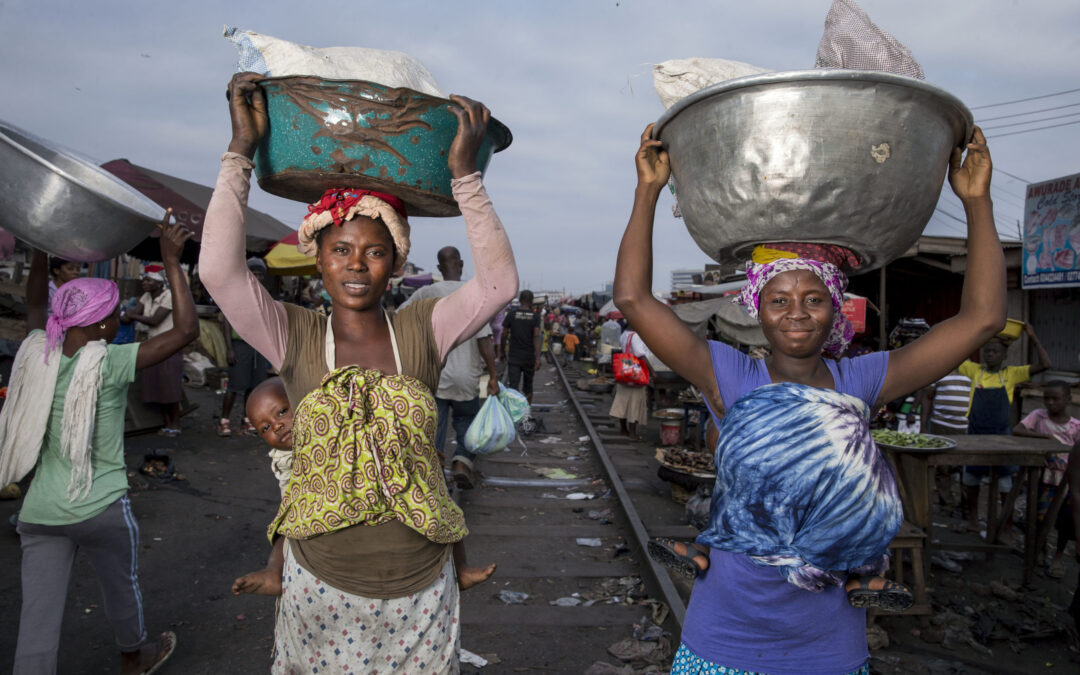
Jun 5, 2024
Through expanded regional and global partnerships, the Organization of Trade Unions of West Africa (OTUWA) is growing its campaign for increased budgetary allocation to health care in the region, said OTUWA Executive Secretary John Odah from Abuja, in a solidarity message to the opening session of the 24th Plenary of the West African Health Sector Unions Network (WAHSUN).
Now in its fourth year, OTUWA’s “Health Care Is a Human Right” advocacy campaign is allying with global union federation Public Services International (PSI), civil society organizations across the region and WAHSUN to better advocate for equal and fair health care access for all who live within the Economic Community of West African States (ECOWAS).
Nearly 83 percent of Africa’s workers are trapped in poorly paid and uncertain informal-sector jobs and lack access to state-provided health care or health insurance—an unfair financial burden on the continent’s most vulnerable individuals. And yet West Africa’s governments are not implementing the 15 percent minimum annual budgetary health allocation to which African heads of state agreed in the landmark 2001 Abuja Declaration. No country in the region achieves this percentage currently.
OTUWA’s campaign, launched in 2020 by national labor federations from five countries, has expanded its reach to health sector unions and national labor centers in eight countries—including the Gambia, Ghana, Ivory Coast, Liberia, Nigeria, Senegal, Sierra Leone and Togo—as well as to civil society organizations such as the International Federation of Women Lawyers (FIDA). The Office of the United Nations High Commissioner for Human Rights with the World Health Organization defines the right to health as “a fundamental part of our human rights and of our understanding of a life in dignity.” The Solidarity Center supports OTUWA in this campaign and on other worker rights initiatives.
“Together we must get public health services out of their chronic state of neglect and underfunding,” Odah told the Solidarity Center, adding that OTUWA’s campaign is adding good governance to its health care demands.
Thus far, the campaign has gathered and released important regional health care worker data and initiated advocacy meetings with national, regional and continent-wide African Union legislators and policymakers, including the Parliament of the Economic Community of West African States (ECOWAS). The campaign most recently saw success in Nigeria earlier this year, where the federal government announced a disbursement of almost $70 million to bolster the country’s health infrastructure.
“Only a transparent, democratic system can secure, fairly allocate and responsibly spend increased health care funds,” said Odah.
OTUWA represents national trade union centers in the 15 West African countries comprising ECOWAS. PSI encompasses more than 700 trade unions that represent 30 million workers in 154 countries.
Watch a video about the campaign.
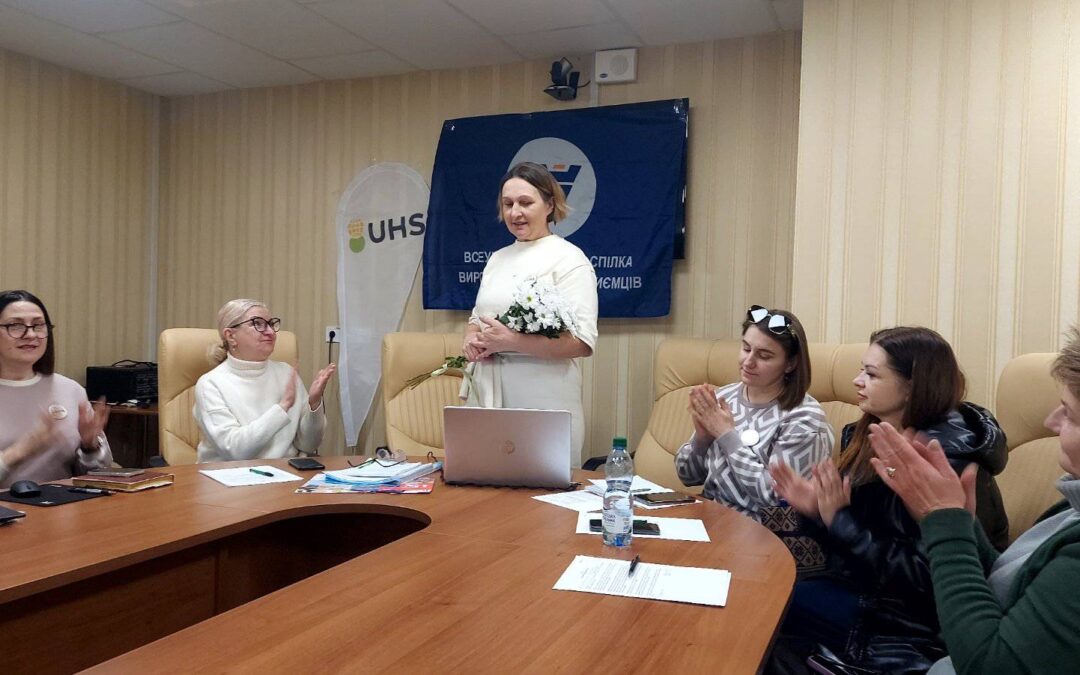
Apr 17, 2024
In a first for Ukraine, in-home childcare workers including nannies and babysitters organized and then elected domestic worker Tetiana Lauhina to head their new labor organization, Union of Home Staff (UHS).
“[My colleagues] are amazingly hard-working and well-educated. I want all of them to be recognized as workers and officially protected,” says Lauhina in a video interview.
The Union of Home Staff (UHS), formed by 17 domestic worker activists, will vigorously advocate with Ukraine’s lawmakers and government to ensure protections for domestic workers and formalization as workers under the country’s labor law.
As an outgrowth of nongovernmental organization Union of Home Staff (UHS), the new union will continue to use its allied organization’s name and acronym, UHS, expanding its services as an information hub and community center, including for its 1,800 Facebook members.
Ukraine’s first nationwide survey of domestic workers last year found that working without contracts and formal recognition had left most survey respondents victims of low pay, wage theft, confusion about employment status, exclusion from the country’s pension system and minimal capacity to exercise their right to freedom of association. And, without legal formalization as workers, Ukraine’s domestic workers lack access to care rights and services for themselves and their families—including maternity and child benefits, long-term care services and disability compensation for workers who die or are injured in their employers’ homes.
“[The domestic worker] is not secure and she is nobody for the state,” says Lauhina.
Because women account for three-quarters of the 75.6 million domestic workers globally, domestic worker rights are key to the achievement of equality. On International Women’s Day this year, the ILO issued a new policy brief urging governments and employers’ organizations to ensure that domestic workers have access to labor rights and social protections.
Nongovernmental organization UHS was formed in 2019 with support from Ukraine labor rights nongovernmental organization Labor Initiatives (LI) and the Solidarity Center to raise awareness about labor rights challenges for Ukraine’s care economy workers and support the country’s legislative efforts to formalize domestic work.









